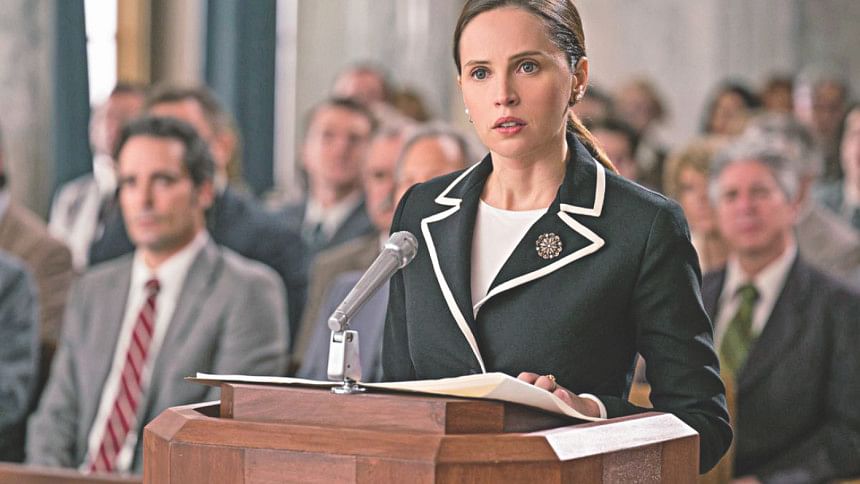AN UNJUST TRIBUTE TO RUTH BADER GINSBURG

Although it lacked the informative and emotive content from the 2018 documentary "RBG," and strayed far from the dynamic persona that Ruth Bader Ginsburg (RBG) encompasses, the biopic depicting the Supreme Justices' early career remains prodigious. It tells the story of a fighter that rises from the ashes and stays in the midst of politics, law and morality, fighting tooth and nail to introduce to the US Constitution the subject of equality. It brings to light the importance of cases such as Roe v. Wade, Reed v. Reed and even Moritz v. Commissioner. Rather than tracing her full career, the movie showcases the first sex-discrimination case that she fought for in federal court, and the fight that she had to put up as a woman in the 50s.
It starts off as RBG (portrayed by Felicity Jones) walks into Harvard, in the midst of some 500 men clad in well-polished suits, pointing to one of the most important parts of the movie – that 1956 was only the sixth year in which Harvard allowed women to earn a law degree. This is merely the starting point in showing the lowly status in which women had to live – having to issue credit cards in the name of their husbands, not being allowed to work overtime, or in the mines. The movie follows the astonishingly brilliant Ginsburg as she asserts her intelligence in a "man's world.", fighting for a place in the heart of a profession that was deemed to be fit only for men.
As the movie proceeds, Ginsburg moves to New York City and eventually finishes her last two years at Columbia, the audience slowly gets to see the supportive, warm and loving Martin Ginsburg (played by the lovely Armie Hammer). It is in fact her husband Martin who brings to her attention Moritz v. Commissioner, a tax case that is the first of many successful cases in Ginsburg's half-century-long fight for gender equality. The case was filed by a caregiver who was denied a deduction usually given to others, and what sets the case apart from others is that while the plaintiff is a man, his win would set a precedent that would apply to women as well.
Jones' portrayal of Ginsburg is certainly one for the ages, as she stands tall and proud in all her eccentric glory, speaking with the kind of confidence that cannot be faked. However, the real Justice had remarked that the only thing the movie got wrong is the portrayal of her in court for the first time at a loss for words. The dialogues from one particular scene in the movie will definitely leave you with chills.
"The word woman does not appear even once in the US Constitution."
"Nor does the word freedom, your honour."
It cannot be stressed enough what a small fragment of Ginsburg's inordinate life the movie captures, and yet, it left me with chills running through my bones. Essentially aimed for an audience whose heart and soul aches for equality, it ends on an emotive note as Justice Ginsburg is pictured walking up the steps of the US Supreme Court (where she was voted into on a 96-3 majority) on the present day. The best of movies are those that leave the audience wanting more, and I don't know about you, but this movie resulted in me researching the internet to find out more about the extraordinaire that is Ruth Bader Ginsburg.
Fariha enjoys binge-watching movies in the dark vicinity of her bedroom. Strike up a conversation with her at [email protected]

 For all latest news, follow The Daily Star's Google News channel.
For all latest news, follow The Daily Star's Google News channel. 



Comments